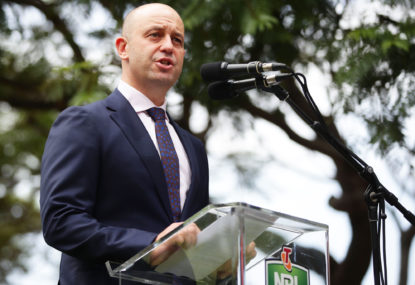If the NRL wants clubs to actually stick to the salary cap, they need to start making the people who benefit most from rorts – the players – truly accountable.
Since 2002, the Bulldogs, Warriors, Storm, Eels and Sea Eagles have come under serious scrutiny for breaching the salary cap – that’s an issue roughly once every three years.
Clearly, the current deterrents are not working.
Yes, administrators and agents have received bans, clubs were docked points and, of course, Melbourne were stripped of their 2007 and 2009 premierships.
But do you know how many players spent time on the sidelines as punishment for their roles in the five aforementioned breaches?
Zero.
In 16 years of scandals, not a single player has been officially sanctioned for giving the NRL the finger in the name of making an extra buck.
That sends a crystal clear message to the next bloke who is offered the chance to help their club cheat the competition by scamming the salary cap: you will not be held accountable.
Or, in short, “Go for it!”
Now, rugby league players are pretty good at playing the ‘I just let me manager handle the money side of things’ card. It sounds believable too, because society loves to perpetuate the myth of the ‘dumb’ footy-head.
But while the manager facilitates the deal, the player signs the contract – or, as was the case in Melbourne, the two contracts.
Put yourself in their shoes (because this is one of those rare occasions where the experience of anyone who’s ever worked stacks up to those of elite athletes).
If your boss put two contracts stipulating different salaries in front of you, promised you’d receive the higher amount, but insisted you sign both anyway, would you honestly believe nothing fishy was going on?
Ditto if a part of your weekly wage came from a completely different company or it was handed to you in a bag at a Macca’s carpark.
You’d know something wasn’t on the level – even if you were a ‘dumb’ footy-head.
Besides, professional athletes are taught from very early on that any substance that enters their body is entirely their responsibility.
Is it such a stretch to expect they take the same accountability for their bank account?
The solution, as I see it, is two-fold.
Firstly, players should spontaneously have their bank accounts audited.
Much as the salary cap auditor goes through a club’s books to ensure everything is on the up-and-up, the NRL should employ a team of financial boffins to go through every player in a club’s top 30 at least once a season and ask pertinent questions about any income that isn’t officially signed off on as under the cap.
Think that’s an invasion of privacy? These are blokes who have a complete stranger follow them into a bathroom to watch them urinate into a jar to ensure they’re not doping.
Having your privacy invaded is part and parcel of being a professional athlete.
The upside is being paid potentially millions of dollars to compete in a league that has made billions of dollars by promising fans – the people who ultimately foot all the bills – their competition is fair, because it has a salary cap.
[latest_videos_strip category=”rugby-league” name=”League”]
Secondly, players found to have benefited from scamming the salary cap receive lengthy bans.
Because, ultimately, cheating the salary cap is a form of doping.
No, a fatter wallet doesn’t necessarily mean you train harder (although if Australia’s Olympic power walkers earned the same salary as the average NRL player just to train and compete, I bet they’d never lose another race). But in a competition where the salary cap is held up as a primary means of ensuring equality, cheating that cap is to manufacture an unfair advantage.
Your team is afforded a benefit that the clubs which stuck to the rules and only spent the allotted amount are not.
What’s more, you’re also screwing over your own teammates, because if you get caught, the whole club’s in trouble.
It’s as selfish an act as that of Nesta Carter, the Jamaican runner who got busted for doping in the 4×100 metres at the 2008 Olympics, so seeing Usain Bolt stripped of his gold in that event, taking away his perfect record of three golds in three events at three Games.
Yet for some reason, when NRL players cheat their opposition and cause their teammates to lose competition points, or even premierships, the punishment they receive is to become wealthier.
Maybe they’re doing it in the pursuit of victory, maybe because they think everyone else is doing it, maybe they’re just greedy.
These are all the same excuses we hear from guys who get popped for steroids.
Yet the NRL goes after those who facilitate and administer financial doping, but seem to turn a blind eye to the guys whose wallets bulk up.
It’s time the primary beneficiaries of this blight on the game stop getting away with it scot-free.
No more blaming the manager – if it’s in your account, it’s your money – if you benefit from your club scamming the cap, you get whacked with a hefty ban.





























































































